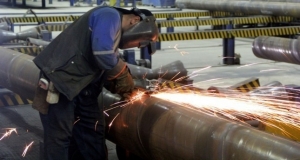


(Posted on 03/09/18)
In the face of additional U.S. tariffs on Turkish steel and aluminum, exporters are looking to explore alternative markets in the Far East and South America.
The move comes after U.S. President Donald Trump announced on Twitter on 10 August that he had approved a doubling of tariffs on steel and aluminum from Turkey.
Speaking to Anadolu Agency (AA), Aegean Ferrous and Non-Ferrous Metals Exporters Association Chairman Yalçın Ertan said that Turkey is the world's eighth largest and Europe's second largest producer of steel.
He said that the sector is growing with new investments every day.
According to Turkish Exporters Assembly (TÄ°M), steel exports reached $8.36 billion in the January-July period this year, with a 27 percent rise compared to the same period last year.
During this period, the largest export destination for Turkish steel was Italy. It was followed by the U.S. with $552 million.
Exports to Far Eastern countries and South American countries, which have been set as the new targets by exporters, stood at $160 million and $225 million, respectively.
Ertan said that the sector exported 1.9 million tons of steel to the U.S. last year. He noted that there is a commercial decline around the globe due to the recent U.S. stance.
"After this implementation, our steel exports to the U.S. have become more difficult. However, we can easily close the gap with exports to Far Eastern and South American countries," he said. He said that the sector is accustomed to this kind of practice and this has actually given them some sense of defiance.
"Like a frontiersman, we can travel all over the world with a bag and sell Turkish steel to the rest of the world," he added.
He said that steel exports to the South American market have gained momentum in recent months and added that exports to Brazil rose by 159 percent to $30 million in the first seven months of the year. "Significant increases have also been recorded in exports to countries like Honduras, Paraguay and Panama," Ertan said.
He claimed that the increase in these markets will continue. "There is a gap in Far East countries emanating from China heading to its own domestic market. Turkish exporters will fill this gap."
Ertan said that Turkish steel entered the U.S. market in 1985 and is one of the most commonly used steels there, both in terms of quality and price.
He stressed that U.S. companies prefer Turkish steel. "But Since Turkish steel does not go there and the U.S. steel production does not meet local demands, steel prices in the U.S. have gone up, pushing it to import more."
The National Grain and Feed Association (NGFA) has applauded Senator Deb. Fischer’s (R-Neb.) reintroduction... Read more
Anglo American plc and Teck Resources Limited have received regulatory approval from the Government... Read more
The Rhodes Ridge Joint Venture has approved a $191 million (A$294 million) (Rio Tinto share $96 million... Read more
Trafigura Group Pte Ltd, a global leader in the commodities industry, has announced its financial results... Read more
Rio Tinto has successfully produced the first copper from the Johnson Camp mine in Arizona using its... Read more
The American Soybean Association’s World Initiative for Soy in Human Health programme and the... Read more
Karlka Nyiyaparli Aboriginal Corporation (KNAC) Registered Native Title Body Corporate and Rio Tinto... Read more
OCI Global, a leading global producer and distributor of nitrogen products has announced that it has... Read more
In December 2024, SSAB was granted a permit by the Land and Environment Court at Umeå District... Read more
The President of the Republic of Guinea has joined project partners WCS1, Baowu, Chinalco and Rio Tinto... Read more